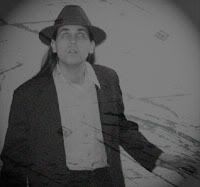Pratchett takes swipe at Rowling. Apparently Rowling's saying she's not writing fantasy novels, or something similar. As Goodkind's been doing the same thing, I think it's safe to say I'm fairly sick of that, now.
Penny Arcade card game. Really, an expansion for an existing game, but I understand you don't have to find the core bits to start up.
I just finished an interesting book - it's called The Coyote Kings of the Space Age Bachelor Pad. I bought it on Thursday, when I was in Lexington for the Bruce Campbell signing (I'm pleased to see my mobile post worked - now I'm working on mobile pictures and audio posts). It's very good, but really for the good bits you need to read it yourself. The strange, unsettling bits are what disturb me.
First, it's not really science-fiction. True, Yehat (supporting protagonist) builds what's essentially mech armor, called "R-Mer," but that's mostly just armor with guns stuck to it. Magic exists, lots of dark gods are wandering about behind the scenes, and so on, so on. It's classified as sci-fi, though, and I've been listening to a series of lectures about sci-fi and fantasy I downloaded last year. Part of what they do in the early lectures is defining the two genres, and I know it's sticky, but it made me think more about it, and despite the style (an urban, locquaciousness usually present in SF) I think it's a fantasy novel.
Second, it's curiously racist. A bit like the Earthsea books, actually, but it's more marked. There's no antogonizing stuff going on, it's just that the white culture is quietly identified with the "evil" side, and the black culture with the "good" side. Through most of my reading I haven't encountered the opposite - true, most protagonists are white, and I think that just reflects who's writing the piece - but usually the villains are white as well, if there's a skin tone at all (Does someone like Sauron really have a natural skin color, after all?).
Interesting thought: is it considered science-fiction because it doesn't equate the traditional gods (Norse gods are used a great deal throughout, on the side of the bad guys) to goodness, even through allegory? A few of the very narrow-minded theories of what fantasy consists of would serve to label anything else as science-fiction.
But then again, I think it's foolish to automatically label anything using ESP as a plot-element as science-fiction - it could just as easily be called "divination." Of course, sometimes the only way to differentiate is by the writer's intention - so it would then depend on the writer's choice of technical versus mystical terminology.
Overall the biggest unsettling thing in the book is that, even though it takes place in a diverse urban area (Edmonton, Canada), the main characters don't have any friends other than people of their own race. If a similar book followed white guys through an urban area like that, and they didn't know any black people (save in bad connotation, like the stupid white video store owner of Coyote Kings), the author would be lynched.
It's just a very curious sort of thing. And I wonder how many people are going to accuse me of being racist after reading this. Hopefully no one, but past conversations have led me to believe not everyone I know is quite as clear-minded on this issue.
Let me reiterate, though - the book is excellent, and it's just that I have a great deal to say on these two subjects, apart from the novel in question. The characters are great, the style is fantastic, noticably changing with each character, and the ideas are really fun.
Now I'm heading into Rob Roy and Dune. This might be a mistake, as there's a very good chance of both being interminably dry. If so I'll just break them up with some of the short stories from the collection I'm going through, Sorcerers' Tales.


0 Comments:
Post a Comment
<< Home